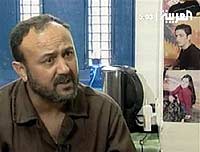BARGHOUTI SPEAKS

Israel is clearly worried.
Here in East Jerusalem and across the Arab world an interview with the jailed Fatah leader Marwan Barghouti is being shown, in which he says that after Wednesday’s Palestinian parliamentary elections a unity government will be formed involving all factions.
Barghouti is serving five life sentences in an Israeli jail for terror-related murders.
A report in Haaretz contains a key sentence. Barghouti gace the interview "with the approval of the Shin Bet security service and the Israel Prison Service."
Barghouti would never have been allowed to speak out if he didn’t have express permission from his jailors.
His jailors would never have allowed him to speak out if it wasn’t in their interests.
The reason is simple.
Fatah is under pressure like never before from the Islamic resistance group Hamas, which is standing for election for the first time.
Israel, the US, and Europe see Hamas as a terrorist organisation. They say they’ll shun a Palestinian government if it includes Hamas.
So a strong showing for Hamas in the polls would place the international community in a difficult position. How can it ignore the democratic choice of hundreds of thousands of Palestinians -- and yet how can it enter into negotiations with an organisation it regards as a terrorist outfit?
Hence the appearance of Barghouti on the TV screens.
He has the respect of the Arab street and could be Fatah’s last best hope of clawing votes away from Hamas.
Many here argue that Fatah only has itself to blame.
I spent today in the West Bank city of Nablus, a former Fatah stronghold which has shifted towards Hamas.
Voter after voter told me that Fatah had shown itself to be corrupt, inept, and incapable of delivering basic services.
For many in the west, Hamas is the embodiment of a terror group that launches suicide bomb attacks that murder scores of innocent Israelis.
But what’s not always understood is that Hamas also has a well-organised grassroots welfare structure, providing the sort of services that the Palestinian Authority has failed to deliver.
What became clear to me in Nablus is that the most ordinary voters there don’t want to vote for suicide bombers.
They want to vote for change.

Israel is clearly worried.
Here in East Jerusalem and across the Arab world an interview with the jailed Fatah leader Marwan Barghouti is being shown, in which he says that after Wednesday’s Palestinian parliamentary elections a unity government will be formed involving all factions.
Barghouti is serving five life sentences in an Israeli jail for terror-related murders.
A report in Haaretz contains a key sentence. Barghouti gace the interview "with the approval of the Shin Bet security service and the Israel Prison Service."
Barghouti would never have been allowed to speak out if he didn’t have express permission from his jailors.
His jailors would never have allowed him to speak out if it wasn’t in their interests.
The reason is simple.
Fatah is under pressure like never before from the Islamic resistance group Hamas, which is standing for election for the first time.
Israel, the US, and Europe see Hamas as a terrorist organisation. They say they’ll shun a Palestinian government if it includes Hamas.
So a strong showing for Hamas in the polls would place the international community in a difficult position. How can it ignore the democratic choice of hundreds of thousands of Palestinians -- and yet how can it enter into negotiations with an organisation it regards as a terrorist outfit?
Hence the appearance of Barghouti on the TV screens.
He has the respect of the Arab street and could be Fatah’s last best hope of clawing votes away from Hamas.
Many here argue that Fatah only has itself to blame.
I spent today in the West Bank city of Nablus, a former Fatah stronghold which has shifted towards Hamas.
Voter after voter told me that Fatah had shown itself to be corrupt, inept, and incapable of delivering basic services.
For many in the west, Hamas is the embodiment of a terror group that launches suicide bomb attacks that murder scores of innocent Israelis.
But what’s not always understood is that Hamas also has a well-organised grassroots welfare structure, providing the sort of services that the Palestinian Authority has failed to deliver.
What became clear to me in Nablus is that the most ordinary voters there don’t want to vote for suicide bombers.
They want to vote for change.

0 Comments:
Post a Comment
<< Home